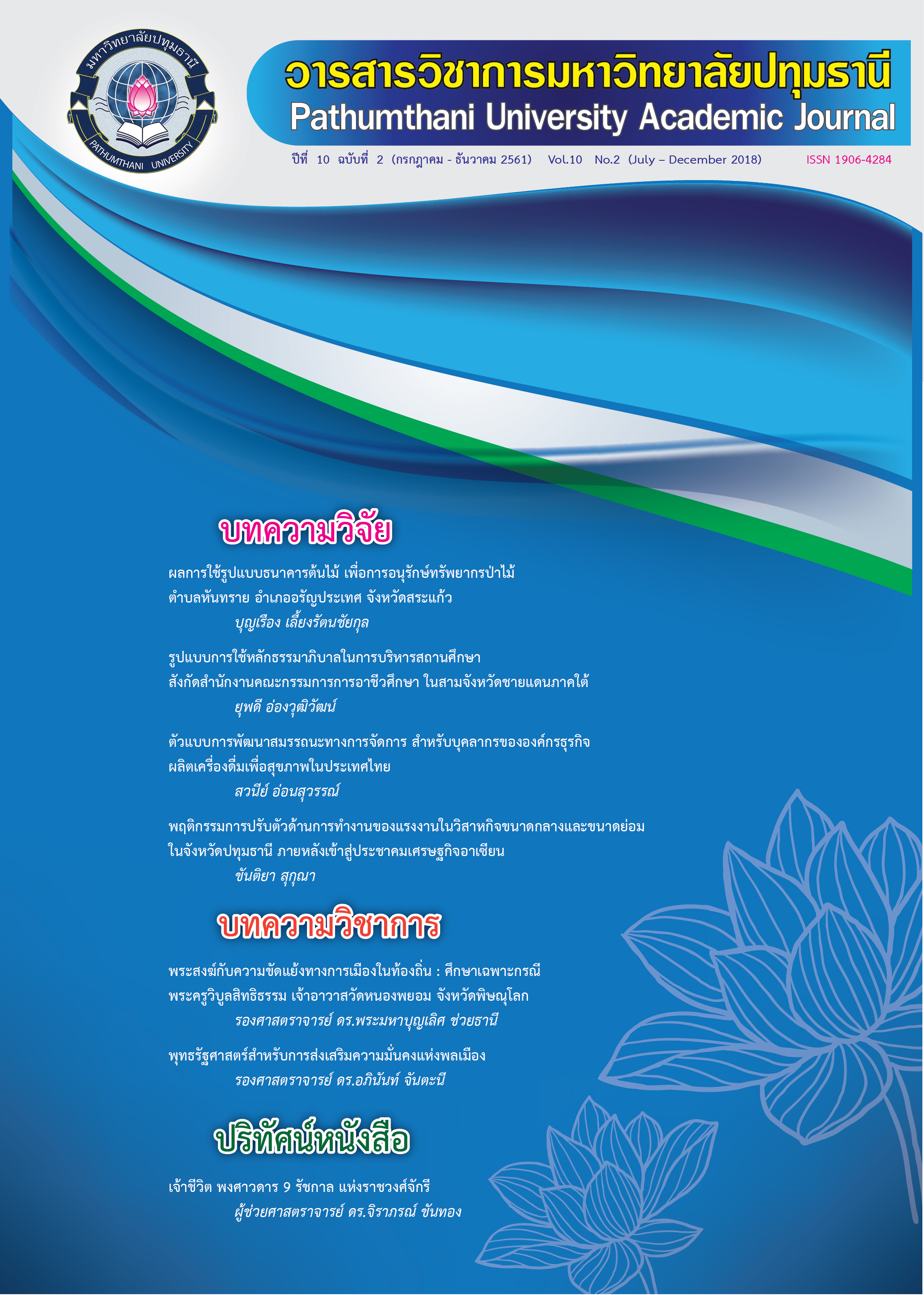การพัฒนาบุคลากรในวิสาหกิจชุมชน จังหวัดเพชรบูรณ์
Keywords:
การพัฒนาบุคลากร, วิสาหกิจชุมชนAbstract
This research was a research in Personnel Development in Community Enterprise of Phetchabun Province. The objectives of this research were to 1) study the guideline for developing Personnel in Community Enterprise of Phetchabun Province to have knowledge, talent, skill and competency for their occupational advancement and 2) study the method of how to do Personnel Development plan and bring the plan toward the operation. Representative sample groups were members of Community Enterprise whose products had been guaranteed from the Thai Community Products Standards Project of Phetchabun Province in the amount of 440 persons. The process used for this research was Mixed Method which studied in both Quantitative Research and Qualitative Research. Tools used for the research combined with Semi-Structured Interview Protocol and Questionnaire that analyzed by descriptive statistic methods which were frequency distribution, percentage, mean, standard deviation and using Pearson’s product-moment correlation coefficient. The different factors comparison had been analyzed by t-test and F-test in pairs when LSD method found difference. The research found that 1. Most of the answerers from representative sample groups of 440 persons were women and their opinion towards the personnel factors in Personnel Development in Community Enterprise of Phetchabun Province was at a highest level. After considering the factors in each aspect, the study found that the “Faith in the leader” aspect had an overall opinion level in a highest level, which included “Executives of Community Enterprise organization had determination and patience to successfully operate the work till it met organization objectives”,“Organization executives support the needed resources for work operation”, “Organizations support working in team”, “Organization support the staffs to consistently continue further education to enhance their knowledge and ability to meet the qualifications of their current position”, “Being good example to keep good reputation and image of the organization”, “Use of principles as life guideline”, “ Has sacrificed thoughts for common interest” and “Adhering to the principles and ethics of their profession”. 2. Overall opinion level in Personnel Development showed that the Executives of the Community Enterprise organization of Phetchabun Province had capacity to look ahead, change or adjust the organizational vision and mission to be obviously seen in Personnel Development for developing the cooperation with colleagues of staffs, enhancing the staffs to sacrifice personal interests for the common interests, ensuring that colleagues can overcome obstacles, individually giving the colleagues the beneficial instructions for their work progress which allowed them to be proud of working together and encouraging them to be interested in developing their own distinctive point to strive towards performance excellence to meet the organizational mission in the same direction.
References
2. ฉัตรทิพย์ นาถสุภา. (2548). แนวคิดเศรษฐกิจชุมชน ข้อเสนอทางทฤษฎีในบริบทต่างสังคม (พิมพ์ครั้งที่ 2). กรุงเทพมหานคร : สร้างสรรค์
3. นิธิ เอียวศรีวงศ์. (2542). การเมืองไทยสมัยพระเจ้ากรุงธนบุรี. กรุงเทพมหานคร : ศิลปวัฒนธรรม.
4. รัตติกรณ์ จงวิศาล. (2553). “การศึกษาภาวะผู้นา และทิศทางใหม่เพื่อการพัฒนาผู้ประกอบการ SMEs”. วารสาร พัฒนบริหารศาสตร์
5. อมรา พงศาพิชญ์. (2546). ความหลากหลายทางวัฒนธรรม กระบวนทัศน์และบทบาทในประชาสังคม. กรุงเทพมหานคร : จุฬาลงกรณม์หาวิทยาลัย.
6. Lau, H.C., Rogers, R.D., Haggard, P., & Passingham, R.E. (2004). “Attention to intention”. Science. 303, 1208-1210.
Downloads
Published
How to Cite
Issue
Section
License
บทความที่ได้รับการตีพิมพ์เป็นลิขสิทธิ์ของวารสารมหาวิทยาลัยปทุมธานี
ข้อความที่ปรากฎในบทความแต่ละเรื่อง เป็นความคิดเห็นส่วนตัวของผู้เขียน กองบรรณาธิการไม่จำเป็นต้องเห็นด้วยเสมอไป และไม่มีส่วนรับผิดชอบใด ๆ ถือเป็นความรับผิดชอบของผู้เขียนแต่เพียงผู้เดียว



